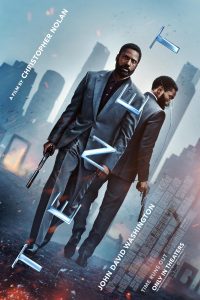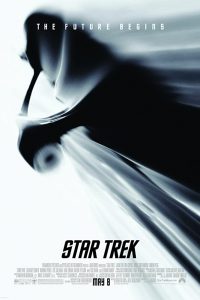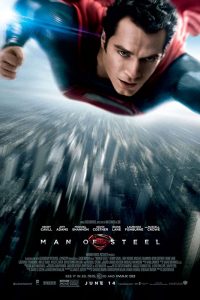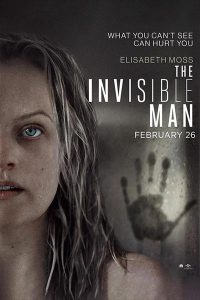The Name’s Protagonist… Anonymous Protagonist: Arley Sorg and Josh Pearce Discuss Tenet
 After a high-stakes operation at an opera house in Ukraine, a CIA agent (John David Washington) is recruited into a mysterious organization, given the codeword “Tenet” as a key to establishing contact with other members. Their objective is to stop an international criminal named Sator (Kenneth Branagh) who uses “time inversion”: a technology which reverses the effects of entropy and essentially causes objects to move backwards in time. The organization believes Sator is out to start World War III; the agent soon learns the situation is even more dire than they suspected.
After a high-stakes operation at an opera house in Ukraine, a CIA agent (John David Washington) is recruited into a mysterious organization, given the codeword “Tenet” as a key to establishing contact with other members. Their objective is to stop an international criminal named Sator (Kenneth Branagh) who uses “time inversion”: a technology which reverses the effects of entropy and essentially causes objects to move backwards in time. The organization believes Sator is out to start World War III; the agent soon learns the situation is even more dire than they suspected.
Arley: It was fun to go to a movie theater.
Josh: Yeah, I’ll bet!
Arley: We went to an IMAX. We figured it would be worth the extra expense because it would be a special effects driven movie. But it was super loud.
Josh: We watched it at the drive-in and it’s such a long movie that our battery died.
Overall, writer/director Christopher Nolan has put together an incredibly entertaining action spy movie with a dash of brain breaking science fictional concept. Your results will vary depending on what you’re going for. As action goes, despite an over-the-top (read: bad) opening scene pulled straight out of Batman-ish cinema, most of the action elements are high paced and smoothly choreographed. The skillful implementation of the “time inversion” idea infuses many of the best action moments with surprise and innovation, pushing this cinematic effort beyond being a “good” action movie and into action art. A few flat or unbelievable scenes are not only forgivable but quickly forgotten. Add to this a handful of great cinematic action moments which don’t rely on the special effects, plus the way Nolan then reframes the bulk of those moments, and what you have is something breathtaking, not just in visceral impact, but in creative scope.
Arley: This is not a character driven action movie. It’s an action driven action movie. The whole point is giving the audience a barrage of cool scenes. Like, the car scene. When I saw the preview, I thought, okay that looks nifty. But on the big screen it’s absolutely gripping. There were moments in this movie where I was like… I’ve never seen that before! To feel that way about an action movie? (Applauds.)
Josh: That’s what Nolan is known for, not character stories or character driven plots. He’s always coming up with something innovative to show you. He’s done Inception: here’s a new use of slow motion or time dilation. With Memento: we’re going to show everything backwards, which this also did. Even the technicality of The Prestige was really intricate. I like how he takes basic movie techniques and just makes that the entire basis of his film. This is like, hey you can reverse film, did you know that? Let’s make an entire movie based on it! It’s such a simple technique but it’s adding a whole new level of innovation to filmmaking that we haven’t seen. It got to the point where, even though I knew what was going to happen, I was excited to see it. The only time I’ve seen something like this done successfully, story-wise, is in C.C. Finlay’s short story, “Time Bomb Time“.
Perhaps one of the biggest weaknesses is the sound mixing, especially when many scenes flash by quickly and you are either keeping up or you missed it. Dialogue is occasionally mumbled, rendered obscure through accent, smothered by noise, or a combination of the three. There’s an entire segment where most of the conversation is unintelligible. Luckily, in some ways, you don’t have to hear everything to get the gist. The plot has few surprises, at least not for seasoned moviegoers. It follows the standard spy thriller beats. When a character is introduced it’s easy enough to guess what their fate will be. When scenes are riveting it’s because of their energy, their visual impact, not because we are worried about the people involved or wondering if the hero will make it through to saving the world.
Josh: It’s a very James Bond movie, there’s a lot of standard spy thriller stuff going on there. Betrayal, and last minute saviors, and stuff like that.
Arley: Part of me was like, I wonder if this is Christopher Nolan’s argument for a Black James Bond.
Josh: This guy’s a better spy than Bond ’cause he has no name!
Arley: The other main point of this movie is the science fictional idea. It’s an action movie with a science fictional idea as an excuse for the action to happen and for all the plot points. I thought the idea was interesting because even though we’ve seen a lot of time travel stories and movies, it’s usually someone essentially appearing at a different point in time. You don’t usually see them moving in a different direction, and interacting while they’re in motion. I’m not sure if the idea makes any actual sense at all?
Josh: The reverse entropy, I don’t know if it makes fully scientific sense, but on a certain level it does, because something that is losing entropy would, supposedly, look like it’s going backwards in time. Supposedly.
Arley: It sounds very suspicious to me. But, honestly, I don’t need it to make that much sense. I was like, okay, good enough.
Josh: I’m glad Kip Thorne is the science consultant It kind of lends a little level of authority to it. Christopher Nolan’s a very technically minded director, and he spent a long time building this one. There will definitely be plot holes cause it’s a time loop movie. Every time loop movie has plot holes. And since it’s a time loop movie we know what’s going to happen.
Arley: How much do you think he was actually involved, though? How much of the physics is on point?
Josh: I think Thorne’s involvement on Interstellar was basically writing all the black hole scenes for Nolan. If he already had that level of collaboration established from previous movies, then there might be something near that level in Tenet as well. The basic underlying physics hold up, ignoring the “inverted radiation” that’s supposed to cause it and however the hell some plot convenient elements work. The movie actually mentions Feynman, which conforms with the idea that in a Feynman diagram, every interaction between particles is reversible. There is no way, just from looking at the interaction, to know which state of things came first and which came later. The only way to perceive a direction of time is by the increase in entropy. So I’m fine with accepting the scientific principle of the idea, to an extent.
Whether or not you understand the physics, it’s parsed out enough for most moviegoers to say “Got it — time travel” and get back into the action; and it’s explained enough for those interested in more rigorous examination of the ideas to have heated debates. A touch of the philosophical as well as deeper theoretical implications is added via a thematic discussion around whether or not the timeline can or should be changed. These ideas are utilized to good dramatic effect, they aren’t just thoughts hurled back and forth between armchair theoreticians.
Josh: I like John David Washington as an actor. He’s good in BlacKkKlansman, and he’s mostly good in this. He plays it with just a straight kind of emotionless affect, which works really well for scenes where he’s in danger. These Russian mob guys are gonna break his fingers and he’s just like, whatever, I have no problems.
Arley: That was awesome! That scene gets telegraphed properly. Because as soon as he’s surrounded, you can tell in his body language that he’s like, okay I guess I have to whup everyone’s asses. I guess we’re gonna do this.
Josh: He showed no nervousness or anything, and then kills them all. But he carries that same flat tone throughout the entire movie, even when he should be showing more emotion. Later he’s talking about, “I’m gonna save this woman and her child,” he’s making a passionate plea about it, and I thought, one: why do you care about this woman? Like, who cares? And two: I don’t buy it at all, ’cause you don’t look concerned, or sound concerned, at all.
Arley: I think the characters agree with you! Because there’s a couple of points where they’re like… wait… are you worried about the woman? I can’t tell!
(Both laughing)
Josh: I’m not sure if it’s intentional or not, because you just see him playing the same kind of flat character throughout, which is fine for some parts, but other parts, it just threw me off.
Arley: I mean, he was good at the end, in that last scene.
Josh: Yeah. Okay. I really like Robert Pattinson’s acting in this, I thought he was great. I used to have a very negative connotation with him, because of his association with Twilight, but now I realized, yeah, you make a bunch of money off of that, and now you can do whatever you want. That’s fine. And he was really good in Lighthouse. In this, he was delivering lines that made me laugh, the way he said them, because they were so ridiculous. “We’re going to start a fire.”
While the acting is mostly good enough, the cinematography features a few stunning moments and shots. It’s easy to lose sight of them in the commotion, but they are there. Notably, perhaps because there are so many wonderful locales put on screen, heavy references to Vietnam are given comparatively poor visual treatment. For writer types and folks who speak dialects of writer, there’s also a fun layer of meta narrative which imparts freshness to what would otherwise be standard dialogue. In fact, the main character is actually listed as “Protagonist.” Finally, the film is stuffed with Easter Eggs of all kinds, whether you are a Nolan fan or the type of viewer who diligently follows details, there are tons of rabbit holes and Google searches to be had following this movie. Ultimately, you have to see it for yourself. You’ll probably have to watch it more than once. And then have awesome debates with friends about what really happened.
Josh: I liked how everything was a palindrome, and the references to the Sator Square.
Arley: There was so much happening. I’m sure I missed a lot but I still had a blast.
Josh: I’m gonna have to watch it I think at least two more times. I know I got the gist of what was going on while I was watching it, but there’s so much happening. It might be one of my favorite Nolan movies, at least recently, but I liked a lot of his older stuff, so I’m not really sure. I liked it better than Dunkirk and Interstellar, at least.
Arley: It just holds you. It’s like, get ready, I’m about to do some shit. And you’re gonna just sit there and appreciate it!
Josh: I feel like it set a kind of high standard for other films that want to do either an innovative science fiction element to their plot or just straight up action. Nolan’s like, look what I can do, just by running my camera backwards. He’s pushing the rest of the field like, what are you gonna do now?
Directed by: Christopher Nolan
Written by: Christopher Nolan
Starring: John David Washington, Robert Pattinson, Elizabeth Debicki, Dimple Kapadia, Michael Caine & Kenneth Branagh

JOSH PEARCE, Assistant Editor, started working at Locus in 2016. He studied creative writing at SFSU and has sold short stories and poems to a variety of speculative fiction magazines. Born and raised in the Bay Area, he currently lives in the East Bay with his wife and sons and spends way too much time on Twitter: @fictionaljosh. One time, Ken Jennings signed his chest.
ARLEY SORG, Associate Editor, grew up in England, Hawaii, and Colorado. He studied Asian Religions at Pitzer College. He lives in Oakland, and usually writes in local coffee shops. A 2014 Odyssey Writing Workshop graduate, he is soldering together a novel, has thrown a few short stories into orbit, and hopes to launch more.
 While you are here, please take a moment to support Locus with a one-time or recurring donation. We rely on reader donations to keep the magazine and site going, and would like to keep the site paywall free, but WE NEED YOUR FINANCIAL SUPPORT to continue quality coverage of the science fiction and fantasy field.
While you are here, please take a moment to support Locus with a one-time or recurring donation. We rely on reader donations to keep the magazine and site going, and would like to keep the site paywall free, but WE NEED YOUR FINANCIAL SUPPORT to continue quality coverage of the science fiction and fantasy field.
©Locus Magazine. Copyrighted material may not be republished without permission of LSFF.







